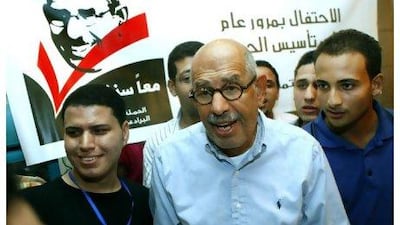CAIRO // The election was a week away, and the Eid holiday blew a stiff breeze through downtown Cairo's streets. The car horns were muted, litter rolled like tumbleweeds over potholes and the legion of loiterers and pedestrians huddled at home, leaving hundreds of campaign posters to shout platitudes into an eerie, empty void.
It was nearly high noon in Egypt, that cinematic moment-before-the-moment when the flawed but earnest protagonist lurches slowly into view, spurs jangling, to defend the cowed townspeople against the snarling forces of corruption.
But Egypt's version of this well-tread motif is less satisfying than Hollywood's. More than two months after he called on opposition political parties to boycott the "rigged" poll, Egypt's own matinee movie cowboy is nowhere to be seen.
Now, with the clock poised to strike 12, many Egyptians are asking: where is Mohammed ElBaradei?
"This is the one-million-dollar question," said Hassan Nafaa, a political economy professor at Cairo University and the former spokesman for the National Association for Change, the pro-democracy organisation that represented Mr ElBaradei's push for constitutional change. Mr Nafaa has since broken with Mr ElBaradei, to whom he has not spoken in two months. "Everybody, as a matter of fact, is annoyed. They are not as enthusiastic as they used to be. I had a lot of differences with him."
Mr ElBaradei once had all the ingredients of a latter-day folk hero. When he returned to Egypt in February from Vienna, where he headed the International Atomic Energy Agency for 11 years, he was greeted at the airport by a crowd of well-wishers carrying posters and wearing T-shirts festooned with his bald, mustachioed likeness.
There was a time when his language was soaked in the machismo of a high plains drifter - the kind of man who travels alone but who speaks as though he were backed by an unseen, ever-loyal posse. He coolly challenged the regime to underestimate him at their peril.
"Anyone who participates in the vote either as a candidate or a voter goes against the national will," he intoned ominously in September, warning those who would legitimise this Sunday's vote by voting. "If the whole people boycott the elections totally it will be, in my view, the end of the regime."
The 'I-ain't-skerred' bombast seemed to work, especially as the regime scrambled to paint Mr ElBaradei as an outsider, a clueless arriviste. His decades in Vienna and New York, Egypt's state-owned newspapers said, had turned him into just the type of man who could easily abandon his post at the revolutionary barricades in order to attend a European dinner party with his fancy-pants friends in the global community of leaders.
As if to prove them right, Mr ElBaradei this month attended a dinner in Hiroshima, Japan, with other Nobel Peace Prize laureates. He visited Mauritius to discuss African economic integration and Brazil as a United Nations commissioner to combat HIV/Aids.
Noble causes, all of them. But what of Egypt and Mr ElBaradei's own call for change? What of the million Egyptians who signed his petition, revealing their names and citizenship identification numbers?
"He has his own vision and timing and will continue to do whatever he judges to be effective, from wherever he is, according to the circumstances," read an e-mail from Mr ElBaradei's brother, Ali ElBaradei, last week. "His position was to boycott the sham election which lacks the necessary guarantees to be free and fair. Under a constitution that is bereft of the basic principles of democracy. He, therefore, is not associated in any way with the election process."
Except, Ali ElBaradei might have said, when he asked opposition political parties to boycott that same election process - a call that most of them gratefully acknowledged and then dutifully ignored.
"He's removing himself from the fight before the fight's started, this is sort of an odd strategic choice," said Shadi Hamid, a political analyst with the Brookings Institution, a Washington-based think-tank.
And yet one believed in Mr ElBaradei, not because he had any power, but because he seemed to come from a place where power was not necessary. After all, his principle demand is that the regime willingly amend the constitution so as to allow him to challenge the regime in an open election - the political equivalent of politely challenging the regime to a duel.
"We thought he was Egypt's best hope for change because everyone could see his international status, his position," said Ahmed Maher, general co-ordinator of the 6th of April Youth Movement, a modest group of young pro-democracy activists. "People in Egypt are exactly like a person who is drowning and just wishes to find a branch to hold onto."

